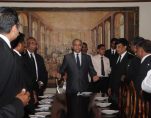Port City Bill Determination: SC’s Dicta On Fundamental Rights & Devolution Need Revisitation

Dr Jayampathy Wickramaratne PC
The determination of the Supreme Court on the Colombo Port City Economic Commission Bill was that as much as twenty-six provisions of the Bill were inconsistent with the Constitution and required to be passed by a two-thirds majority in Parliament. The Court, comprising Chief Justice Jayasuriya and Justices Aluwihare, Priyantha Jayawardena, Murdu Fernando and Janak De Silva, further determined that nine provisions of the Bill also required the approval of the People at a referendum.
Among the grounds of challenge was that the Bill effectively undermined the sovereignty and territorial integrity of Sri Lanka and infringed on the sovereignty of the People. It was argued that several provisions undermined the legislative power of the People reposed on Parliament. Several provisions were challenged as violating fundamental rights of the People and consequently violating Article 3, read with Article 4(d) of the Constitution. Another ground of challenge was that the Bill contained provisions that dealt with subjects that fall within the ambit of the Provincial Council List and thus had to be referred to every Provincial Council for the expression of its views thereon as required by Article 154G(3).
Applicable constitutional provisions
Article 3 of our Constitution recognises that “[i]n the Republic of Sri Lanka, sovereignty is in the People and is inalienable”. Article 3 further provides that “Sovereignty includes the powers of government, fundamental rights and the franchise”. Article 3 is entrenched in the sense that a Bill inconsistent with it must, by virtue of Article 83, be passed by a two-thirds majority in Parliament and approved by the People at a referendum.
Article 4, which lays down the manner in which sovereignty shall be exercised and enjoyed. For example, Article 4(d) requires that “fundamental rights which are by the Constitution declared and recognised shall be respected, secured and advanced by all the organs of government and shall not be abridged, restricted or denied, save in the manner and to the extent hereinafter provided”. Article 4 is not listed in Article 83 as a provision that is entrenched. In its determinations on the Eighteenth Amendment to the Constitution Bill, 2002 and the Nineteenth Amendment to the Constitution Bill, 2002,a seven-member Bench of the Supreme Court (Chief Justice Sarath N. Silva and Justices Wadugodapitiya, Shirani Bandaranayake, Ismail, Edussuriya, Yapa and J.A.N. De Silva) noted with approval that the Court had ruled in a series of cases that Article 3 is linked up with Article 4 and that the said Articles should be read together. This line of reasoning was followed by the Court in its determination on the Twentieth Amendment to the Constitution Bill.https://5158ced2ebc1436cbfb018a2099f19a6.safeframe.googlesyndication.com/safeframe/1-0-38/html/container.html
Under Article 154G(3), Parliament may legislate on matters in the Provincial Council List but under certain conditions. A Bill on a matter in the Provincial Council List must be referred by the President, after its publication in the Gazette and before it is placed in the Order Paper of Parliament, to every Provincial Council for the expression of its views thereon. If every Council agrees to the passing of the Bill, it may be passed by a simple majority. But if one or more Councils do not agree, a two-thirds majority is required if the law is to be applicable in all Provinces, including those that did not agree. If passed by a simple majority, the law will be applicable only in the Provinces that agreed.
